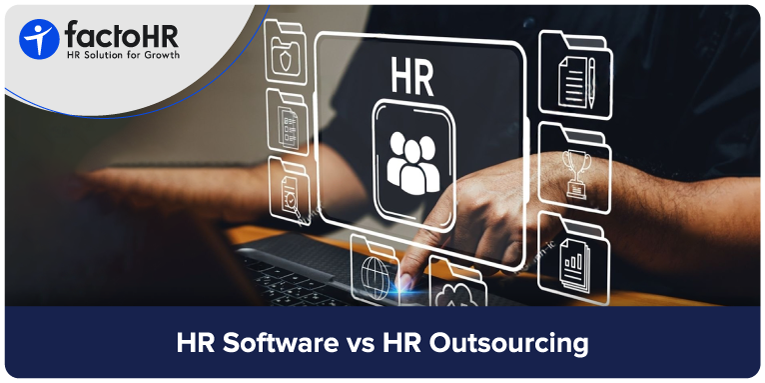HR Software vs HR Outsourcing: Which is Best for You?

Table of Contents
Businesses today face a dilemma in HR management of choosing between HR software and outsourcing service providers. When deciding between HR software and HR outsourcing, it’s essential to analyze your organization’s operational control requirements. However, this comparison is more complex and needs consideration of local labor law compliance complexities.
Here is an article based on the experience of our expert teams, outlining key factors to consider when selecting an HR solution. Plus, it also covers what is HR software and outsourcing, their benefits, drawbacks, and key differences.
But first, let’s understand the basics of HR software.
What is HR Software?
HR software includes a set of tools and applications that help automate core human resource activities within an organization. HR software simplifies HR activities and eliminates much of the manual workload. HR software components eliminate mistakes, increase efficiency, and boost overall HR productivity.
Organizations use two types of HR software systems to optimize core business operations: HRIS and HRMS.
So, what is an HRMS or HRIS?
A Human Resource Management System (HRMS) enables companies to automate key tasks, including hiring, onboarding new staff, payroll processing, and more. The Human Resource Information System (HRIS) helps organizations manage and store employee data.
Thus, if you’re looking to implement HR software to automate your HR management, HRMS and HRIS are essential systems to consider.
Pros & Cons of HR Software
HR software has many benefits, including automating repetitive tasks and ensuring the accuracy of employee data. However, there are disadvantages too. Here are the key pros and cons of HR software.
| Advantages of HR Software | Disadvantages of HR Software |
|---|---|
| Helps in maintaining compliance with labor laws | Customizing the platform according to unique organizational needs can be complex |
| Enables data access and management for employees | There can be resistance to the adoption of such digital systems by some employees |
| Offers actionable insights into HR operations through advanced analytics | Due to dependency on the technology, HR system issues can cause disruptions. |
| Centralizes the human resources data, making it easy for admins to manage teams. | A big downside of HR tools is that they can be hard for workers to learn. |
| Provides end-to-end automation of critical tasks, reducing errors and allowing HR managers to dedicate more time to strategic initiatives. | They do all the steps of key jobs, cut mistakes, and let HR leaders focus more on big plans. |

What is HR Outsourcing?
HR outsourcing involves delegating HR tasks to a third-party service provider. This allows you to focus on essential functions, such as creating HR plans, making important decisions, and managing the business. That’s why HR outsourcing is growing rapidly and is expected to reach $57.59 billion by 2033, with a 4.3% annual growth rate.
These service providers also provide HR advice and manage payroll. They are often HR firms or consulting groups.
Some of the key tasks that you can outsource are,
- Payroll processing
- Recruitment process
- Compliance management
- Employee data management
- HR data analytics
Pros & Cons of HR Outsourcing
Here are the key benefits of HR outsourcing, along with some drawbacks to be aware of.
| Advantages of HR Outsourcing | Disadvantages of HR Outsourcing |
|---|---|
| Saves labor costs of having an in-house team | Due to the reduction in oversight and the use of an external HR service, issues may arise. |
| Assists you in utilizing expert knowledge of HR professionals for local labor law compliance. | Providing employee information to outside firms can pose a risk. |
| Boosts work and frees up staff to focus on company goals. | Over-reliance on a vendor or service provider is a significant drawback of outsourcing HR tasks. |
| Enables you to enhance adaptability and quickly respond to changing business requirements. | Aligning policies and the work of the outsourcing team with internal teams can be challenging. |
| Minimizes the chances of data leaks and ensures compliance with information regulations, including GDPR and others. | Maintaining service quality can be challenging and may lead to disruptions. |

HR Software vs HR Outsourcing: Which is Right for You?
At this point, you should have a good understanding of HR outsourcing. However, when comparing it to HR software, the outsourcing of a complete operation varies on multiple levels.
HR software allows your in-house teams to automate, track, and process essential functions. So, when to use HR software? And what are the key factors to keep in mind while choosing between software and outsourcing HR functions?
Well, here are the answers you need!
HR Decision Factors You Need to Keep in Mind
When you choose the best HR solution for your organization, it can make outsourcing redundant. However, hr management outsourcing does have its merits. So, to decide between HR software vs HR outsourcing, you need to consider,
- Control and Oversight – A key factor in HR decision-making is the level of control you have over HR operations. This means control and oversight over employees, operations, and processes.
- Costing – Every organization has a specific set of budgets, and when choosing an HR solution, you need to compare them based on the total cost of operations.
- Scaling – As your business grows, the total number of employees within your team will also increase. Managing these employees needs a solution that can easily scale on demand.
- Expertise – When deciding between software and outsourcing for HR, consider the expertise in human resources. A proven track record of efficient operations in HR niches is a key consideration.
- Compliance – HR operations require compliance with not only labor laws but also secure access to data. When selecting an HR solution for your organization, ensure it complies with all local laws, particularly data protection regulations.
- Tech expertise – With the evolving human resources needs, you will have to adapt, and that is why choosing a more advanced solution makes sense. You must consider whether HR software or hiring an HR service provider will provide better innovations.
- Toolchain access – HR operations require specific automation. Better access to the automation toolchain is essential. Although outsourcing providers use specific tools, HR software often includes pre-built toolchains that teams can access for particular functionalities. Functions like performance management software (PMS), human capital management (HCM) tools, and Learning Management Systems (LMS) are essential components of HR software, helping teams tailor their operations to meet organizational goals.
- Hiring and recruitment – One of the key parts of HR operations is recruitment. You need an HR evaluation, and then choose an option that helps ensure a seamless hiring and recruitment process.
- Response time – Which approach will provide you with a better response time is a crucial assessment before choosing between HR software vs HR outsourcing. It helps you reduce delays and disruptions in your HR operations.
HR Software vs HR Outsourcing: Key Differences
Here is a comprehensive comparison between HR software and HR outsourcing.
| Key Differentiator | HR software | HR Outsourcing |
|---|---|---|
| Control and oversight | Higher control due to management of HR processes in-house. | Lower control is exercised as the external service provider manages HR functions. |
| Total cost | Offers a choice between a one-time purchase and a subscription-based engagement. | Costs may include service fees, depending on the type of services you opt for. |
| Scalability | Scalable based on the rising needs of your organization, but can require additional costs for modules. | Scalability can be easier, but additional services can be more expensive. |
| Domain expertise | HR software is created by domain expertise | High domain expertise from external partners. |
| Compliance | Compliance features are built into the software. | Service providers often handle the compliance management. |
| Tech expertise | Users must either possess or develop technical proficiency to use software effectively. | The provider offers tech support, reducing the need for in-house technical expertise. |
| Toolchain access | Access to various HR tools, depending on the software features; integration may be needed. | The provider typically has established tools and processes that often integrate seamlessly. |
| Hiring and recruitment | Recruitment functions are managed through the software, which requires user engagement. | Outsourced, often with specialized recruitment teams handling processes. |
| Response time | Response time is dependent on the in-house team’s capacity. | Faster response times are achieved through dedicated teams and resources. |
Final Thoughts: Aligning HR Strategy with Business Goals
Choosing between HR software and HR outsourcing isn’t a simple decision. Both options have their pros and cons. However, you need to consider factors such as cost, scalability, the specificity of your HR needs, and the time it takes to respond to make a decision.
What is the appropriate level of supervision for HR functions, automation processes, and the potential expansion of the team? These are crucial questions that need answers. You can certainly establish a strategic process by making it practical, incorporating the essential element of HR audits.
So, if you’re looking for HR software that can automate tasks, reduce costs, and streamline the whole process, factoHR can help. Get a free demo today and transform your HR operations.
Grow your business with factoHR today
Focus on the significant decision-making tasks, transfer all your common repetitive HR tasks to factoHR and see the things falling into their place.

© 2025 Copyright factoHR


